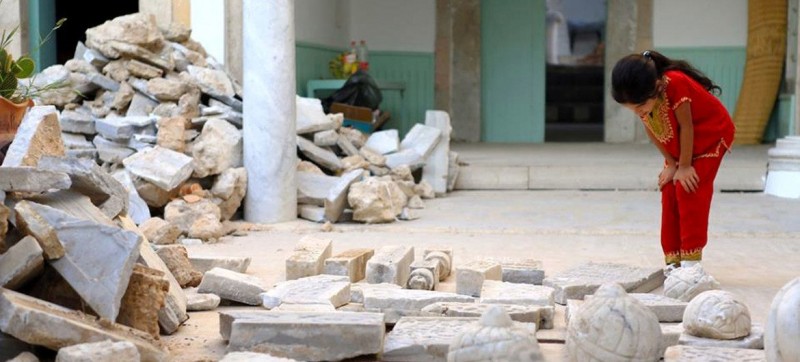A girl looks at the ruins of the destroyed Othman Basha Sufi seminary in central Tripoli. Leaders in Libya must resolve outstanding issues so that long-awaited presidential and parliamentary elections can finally be held, UN political affairs chief Rosemary DiCarlo told the Security Council on Monday. “The United Nations’ priority in Libya remains to facilitate a return to the electoral process, based on a sound and consensual constitutional basis for elections. This is what the Libyan people have asked for,” she declared.
Elections the only path to settle disagreements over the democratic legitimacy of Libyan institutions. I urge the leadership of the House of Representatives and the High State Council to agree on outstanding issues so polls can happen as early as possible. https://t.co/J0s6UwrlOO
— Rosemary A. DiCarlo (@DicarloRosemary) June 27, 2022
Ms. DiCarlo commended recent progress following a final round of UN-facilitated consultations on the constitutional basis for the vote, which has been delayed since December.
Consensus and differences
The talks were held in held in Cairo, Egypt, and brought together representatives from two rival legislative chambers – the House of Representatives (HOR) in the east, and the High State Council (HSC), based in the western city of Tripoli – to review a reformed constitution that charts the way to a democratic future for all Libyans.
Delegates reached broad consensus on most of the contentious articles in the 2017 Constitutional Proposal, though differences remain on measures governing the transitional period leading to the elections.
Seize the opportunity
The outcome marked “a step in the right direction”, said Ms. DiCarlo, and leaders will meet in Geneva this week in efforts towards resolution.
“It is my hope the upcoming meeting in Geneva between the heads of the House of Representative and High State Council will lead to a final and implementable agreement that would lead to the elections at the earliest possible date,”
Meanwhile, continued political divisions are contributing to a tense security environment in and around Tripoli, stemming from the standoff between two rivals who both claim to be the legitimate Prime Minister.
Tensions rising
The crisis erupted in March after the HoR selected a new government. However, the UN and internationally-backed interim premier, Abdulhamid al-Dbeibah, refused to stand aside.
Fathi Bashagha, the eastern parliament’s choice, entered Tripoli backed by armed militia, leading to clashes between their supporters.
Ms. DiCarlo warned of the risk of escalation as armed groups continue to position themselves in support of either man, and reiterated her call for maximum restraint and dialogue.
Oil shutdown costing billions
The political impasse is also affecting the economy. Ms. DiCarlo reported that the partial shutdown of the oil sector continues. Since mid-April, Libyan oil exports have reduced by one third, costing the country more than $3 billion in lost revenue.
“In addition, the disagreement over the control and use of public funds that triggered the partial shutdown continues and could lead to further oil field closures in the near term,” she warned.
The Council also heard about the ongoing “alarming” human rights situation in Libya.
Erosion of civil space
Ms. DiCarlo said nine civil society and humanitarian workers, who were arrested between November and February for exercising their right to freedom of expression, are still in detention.
“I remain concerned that civic space is consistently being eroded. Arbitrary restrictions continue to be imposed on civil society organisations. Politically active women and men defending human rights are targeted with hate speech and incitement to violence, compromising their safety and security,” she told ambassadors.
The UN Mission in the country, UNSMIL, has also received reports of serious allegations of torture against Libyans, migrants, and asylum-seekers in detention facilities and prisons.
Ms. DiCarlo stressed that the authorities must investigate all allegations of torture and other violations, and those responsible must be held accountable.
She further called for extending the mandate of an independent fact-finding mission that is investing and reporting on violations.




Comments are closed.